Contents
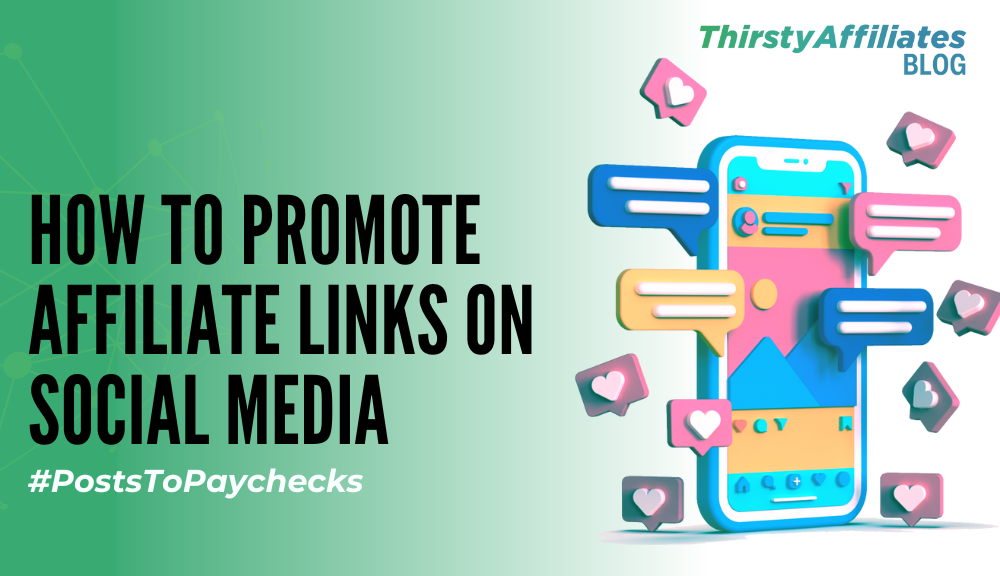
Social media has evolved far beyond its original role of keeping us connected with friends and family. Today, it’s a bustling business opportunity for everyday individuals and experienced content creators alike.
If you’re exploring the idea of how to make money on social media or you’ve already been doing it for years as an affiliate marketer, social media is a powerful way to promote just about anything – including affiliate links.
However, success isn’t as simple as hopping into your favorite social app, writing a post, then expecting a huge pile of money to pile up. You have to put your efforts into the right platform.
Each social network has its unique vibe and appeals to different demographics, which can dramatically affect how well your posts perform. Whether you’re sharing eye-catching images on Instagram, sparking conversations on Facebook, or uploading how-to videos to YouTube, the success of your promotion strategies hinges on knowing where your audience spends their time and what kind of content they prefer.
In this post, we’ll explore the benefits of using social media for affiliate marketing and highlight the best platforms to focus on. We’ll also provide practical tips on how to effectively utilize each platform to promote affiliate links and boost your earnings through social media selling ThirstyAffiliates tactics.
5 Reasons Why You Should Promote Affiliate Links on Social Media
Over 5.4 billion people around the world are on social media nowadays. And what they’re doing ranges anywhere from reposting viral cat memes to actually earning a reliable income stream.
If you’re still sucked into this post, that probably means you’re here to learn more about the latter option.
Promoting affiliate links on social media platforms is an effortless way to convert your daily online activities into profitable opportunities.
Here are 5 compelling reasons to start sharing affiliate links on your social media channels:
1. Massive Audience Reach: Social media breaks down geographical barriers, connecting you to a worldwide audience with just a few clicks. Whether you’re sharing a post on Facebook, a tweet, or an Instagram story, each status update has the potential to reach thousands, even millions, of customers.
2. Interactive Engagement: One of the greatest strengths of social media is the ability to engage directly with your audience. This platform offers more than just posting content and leaving it to get lost in the online world. With two-way conversations (such as comments, likes, and shares), your content is constantly being re-visited and sparking up new conversations.
3. Variety of Content Formats: Social media platforms are incredibly versatile, allowing you to use different content formats to promote affiliate products. Whether it’s a video tutorial on YouTube, a photo gallery on Instagram, or a listicle blog link on Twitter, each platform offers unique ways to engage your audience and present products attractively.
4. Cost-Effective Marketing: Starting with affiliate marketing on social media can be very budget-friendly. You can begin organically, growing your audience without any upfront costs, and later scale with paid ads targeted at specific demographics.
5. Leverage Influencer Collaborations: Influencers bring credibility and a ready-made audience that trusts their recommendations. A shoutout or product feature from a trusted influencer can significantly boost your visibility and sales.
If you’re already familiar with navigating social media, why not harness that expertise to drive income? Promoting affiliate links allows you to build a business directly within a platform you use on a daily basis.
Start leveraging your social media presence today and transform your interactions into rewarding opportunities!
Things to Consider Before Choosing the Best Social Media Platforms for Affiliate Marketing
Getting into affiliate marketing on social media means making some smart choices right from the start. The platforms you choose can have a big impact on how visible and effective your affiliate promotions turn out to be.
Here are a few things to think about when picking the best spots to place your affiliate links:
Understand Your Audience
Before anything else, know who you’re trying to reach. Each platform attracts different types of users, so it’s important to pick the one where your target audience is most active.
For instance, if you’re aiming to connect with a younger crowd, TikTok and Instagram are great choices because they’re popular with teens and young adults who enjoy engaging with creative and visual content.
On the other hand, if you’re promoting business or professional products, LinkedIn would be a better fit because it’s tailored to professionals and companies looking to network and share industry-related content.
Knowing where your audience spends their time helps you place your affiliate links where they’ll be most effective.
Consider the Content Type
Picking the right social media platform to promote your affiliate links comes down to matching your content type to the platform’s strengths.
Instagram and Pinterest are fantastic for anything visual, making them ideal for stunning images and creative visuals, perfect for topics like fashion, travel, or home décor.
YouTube is best for longer video content where you can provide detailed tutorials, product reviews, or demonstrations. Here, you have all the time in the world to get into the nitty-gritty details and really educate your followers.
Twitter, on the other hand, is all about quick, snappy updates. It’s great for sharing timely news, quick tips, or sparking conversations with your audience in real-time.
Choosing a platform that fits your content style not only makes your life easier but also helps you connect better with your audience, making your affiliate promotions more effective.
Engagement and Feedback Opertuntites
Taking the time to explore and differentiate the engagement options will give you a better idea of how you can expect your audience to interact with how you promote affiliate links on social media.
- Likes: A simple tap shows approval and boosts your visibility and credibility.
- Shares: Sharing your content means reaching wider networks, exponentially increasing your reach.
- Comments: These offer a space for meaningful engagement, where followers can provide feedback and spark discussions.
- Direct Messages (DMs): These allow for one-on-one interactions, making them great for addressing specific questions or concerns.
- Polls and Surveys: Use these to directly engage and gather insights from your audience, helping you tailor your content more effectively.
- Live Videos: Engage with your audience in real-time, fostering a strong sense of community and immediate interaction.
Familiarizing yourself with these engagement types will enable you to craft your promotions to maximize interaction, ultimately leading to more clicks and better conversions.
Algorithm and Organic Reach Potential
Getting your head around how social media algorithms work can really make a difference in how many people see your posts. For example, on Facebook and Instagram, the algorithms often favor personal over business content.
This might mean your affiliate links don’t get as much airtime unless you’re willing to pay for some extra visibility.
Meanwhile, on newer platforms like TikTok or more niche ones like LinkedIn, you might find it easier to get your content seen without spending a dime.
These places aren’t as crowded, so your posts have a better shot at catching people’s eyes naturally.
By keeping these algorithmic behaviors in mind, you can more effectively choose the social media platforms that align with your affiliate marketing goals. This strategic selection ensures that your efforts are not only visible but also successful in reaching your target audience.
The Best Social Media Platforms for Affiliate Marketing
Not all social media platforms are created equal, especially when it comes to affiliate marketing. We’ve briefly touched on a few popular ones, but let’s dig a little deeper.
In this section, we’ll look closer at some of the top social media platforms and explore how their unique features can really boost your affiliate marketing efforts. This will help you pinpoint the platform(s) that aligns with your promotional needs.
Facebook continues to be a top choice for affiliate marketers, and it’s easy to see why. With over 3.065 billion active monthly users, it’s the most popular social media platform used around the world.
That means no matter who your target audience is – from teenagers snapping selfies to professionals browsing for industry news – you’re likely to find them here.
When it comes to sharing your affiliate links, Facebook gives you plenty of creative ways to connect with your audience. You can keep your followers engaged with a mix of videos, posts, and stories. This variety lets you test out different content types and see which ones your audience really clicks with.
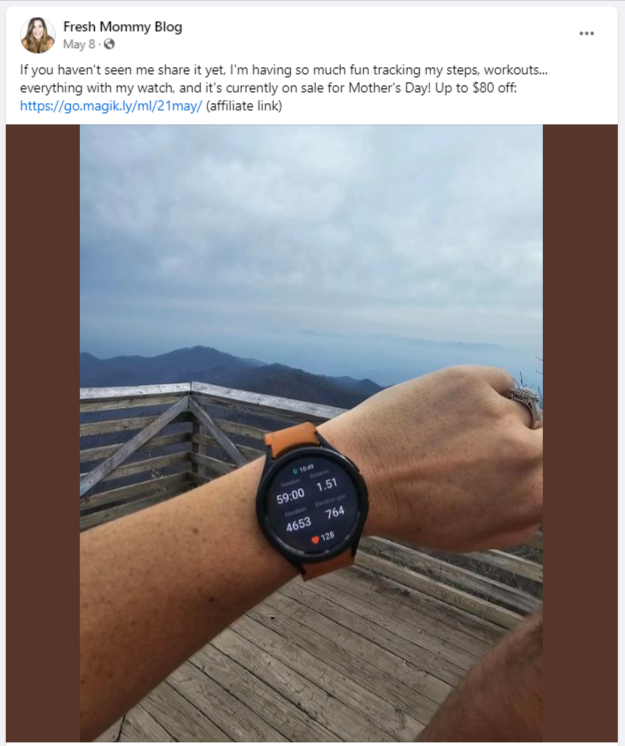
Facebook is also a fantastic place for building a community. Whether it’s through groups that foster continuous interaction or direct chats via comments and messages, these tools help you strengthen relationships with your followers.
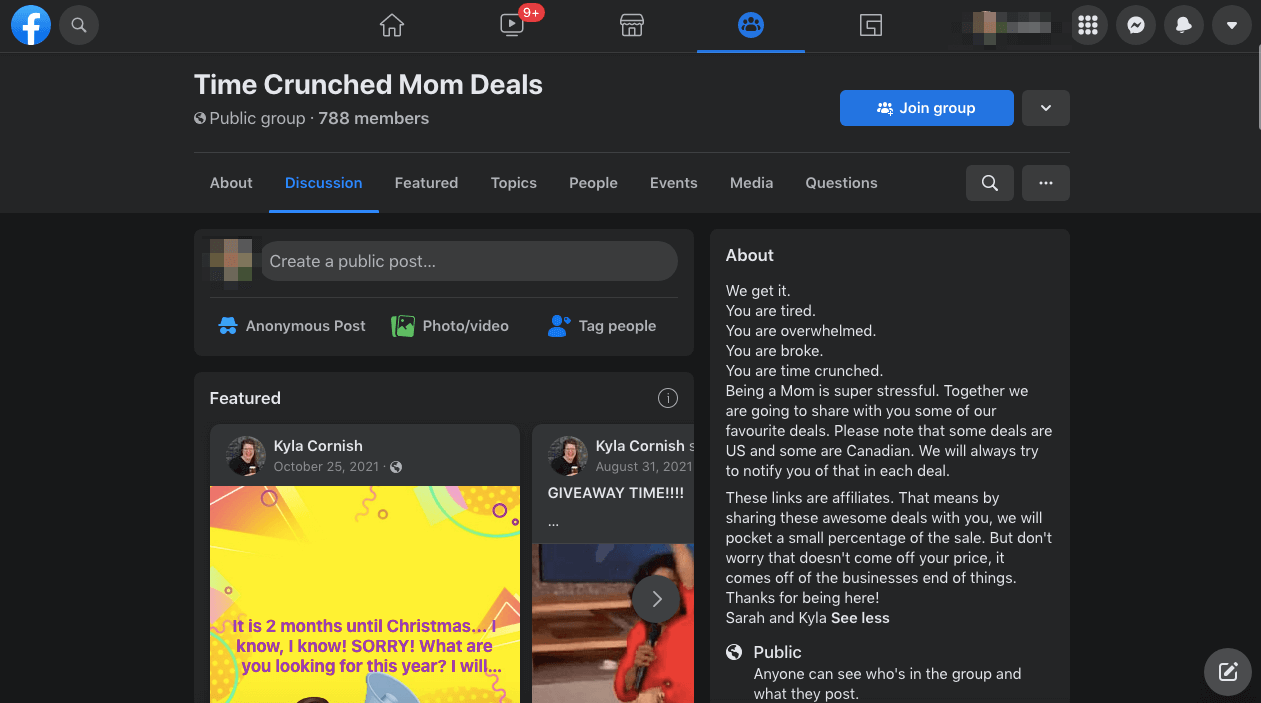
Such engaging interactions can turn a casual browser into a committed follower, which is key to amplifying your affiliate marketing success. This personal touch makes sharing your affiliate links feel more natural and can significantly boost your conversion rates.
Instagram is a vibrant platform perfect for affiliate marketing, especially if you’re targeting younger audiences who love visual content. Its visually driven nature makes it ideal for showcasing affiliate products in engaging and appealing ways.
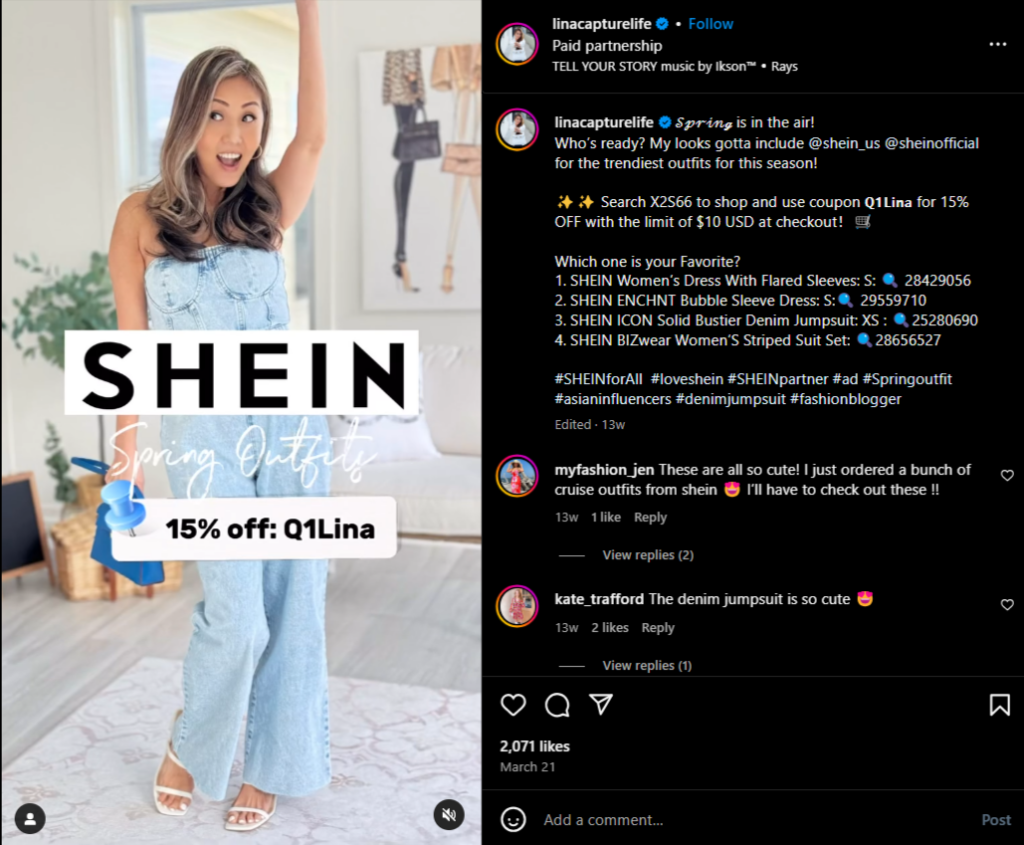
Unlike Facebook, which balances text and images, Instagram focuses heavily on visuals. Whether you’re sharing eye-catching graphics, quick Reels, or in-depth Stories, Instagram is all about creating memorable, movie-like impressions. This approach pays off too!
Over 58% of people say they’ve become more interested in a brand or product after seeing it on Instagram Stories, underscoring the power of visual content.
Instagram also makes it easy for followers to buy the products you promote. With features like direct product links in Stories and link in bio pages, your audience can make purchases right within the app.
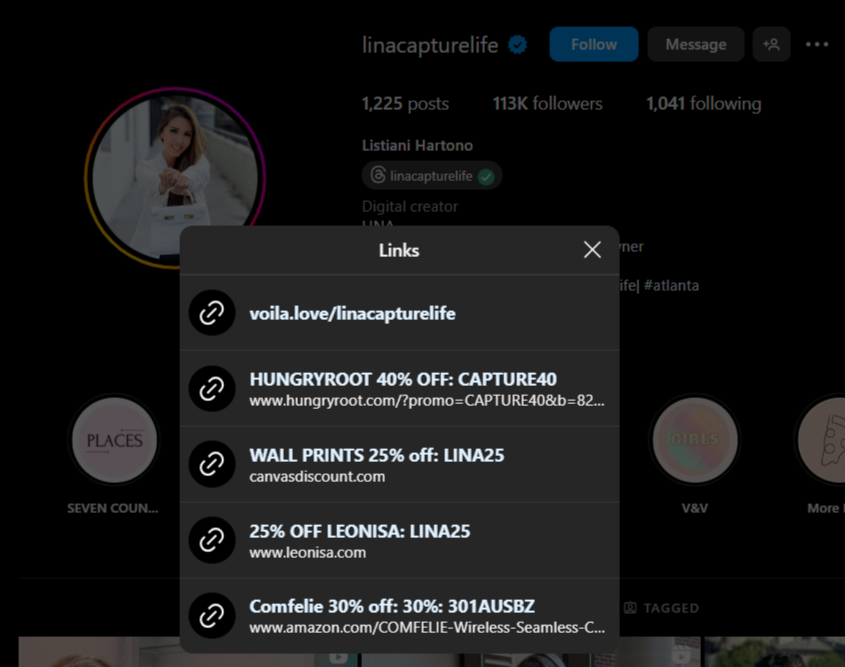
This seamless process not only enhances the shopping experience but also significantly boosts your conversion rates.
X (Twitter)
X is where action happens fast, making it a fantastic platform for affiliate marketers who love to stay on the pulse of the moment. It’s all about speed and timeliness here, allowing you to drop your affiliate links right into the heart of trending conversations and hot topics.
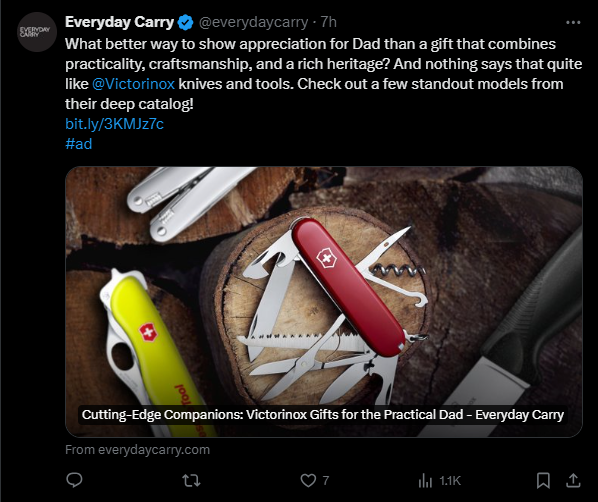
When you’re not racing to the top of feeds, X throws in another challenge: character count restrictions. With just 280 characters to work with, you have to be clear and creative, ensuring your message hits home without overwhelming your audience. This limitation can actually be an advantage, helping you craft concise and impactful content.
And then there’s the power of hashtags – X’s secret weapon. Throw in some well-chosen hashtags, and your posts can travel far beyond your usual audience, reaching new eyes and driving more clicks to your affiliate links.
YouTube
As the world’s most popular video platform and the second-largest search engine, YouTube helps your content reach a massive audience. What makes YouTube so effective for affiliate marketing is its ability to show, not just tell.
Videos allow you to provide detailed demonstrations and in-depth reviews of products, offering a level of persuasion that text or images alone can’t match. When viewers see a product in action or hear about your personal experience, they’re much more likely to click on your affiliate links in the video description:
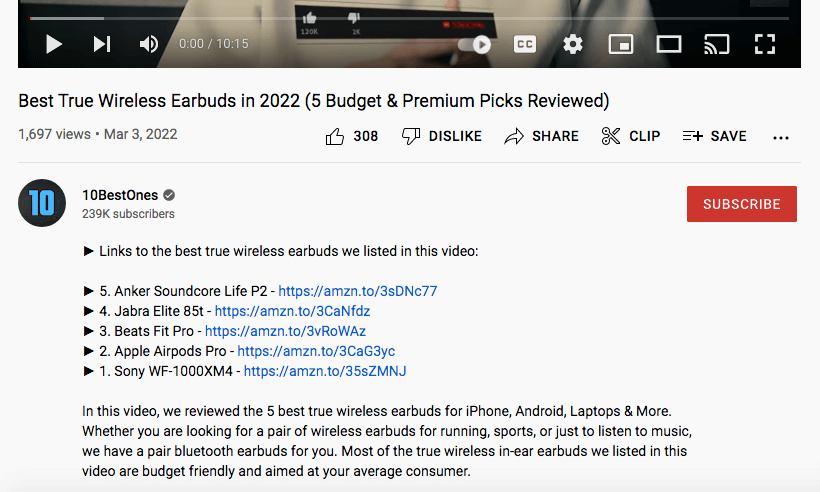
YouTube is also great for long-form content, allowing you to create detailed narratives around your products. Whether it’s tutorials, how-tos, or informative videos, the longer engagement time helps build credibility and trust with your audience.
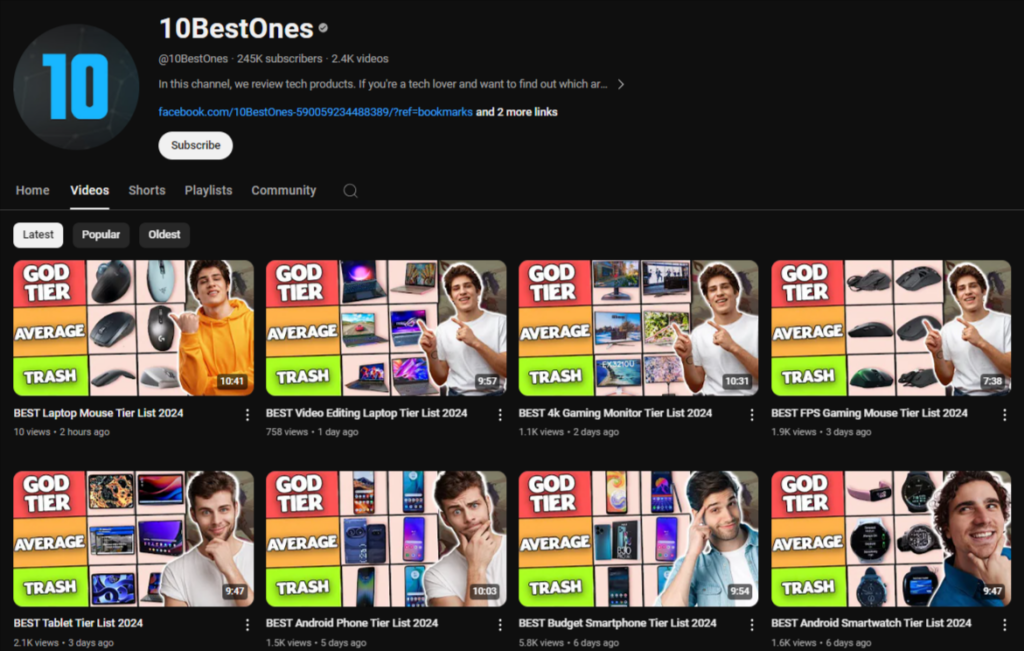
Finally, features like Youtube Cards and End Screens make it super easy to link directly to products. This means viewers can click on your affiliate links without ever leaving the video, making the whole process smooth and user-friendly.
Pinterest is perhaps the all-in-one social media platform for affiliate content promotions. It’s got room for beautiful imagery, quick video snippets, and provides a quick gateway to additional long-form content.
With millions of active users searching for inspiration and planning their purchases, Pinterest offers a unique opportunity to share your content and showcase your affiliate products to an engaged audience.
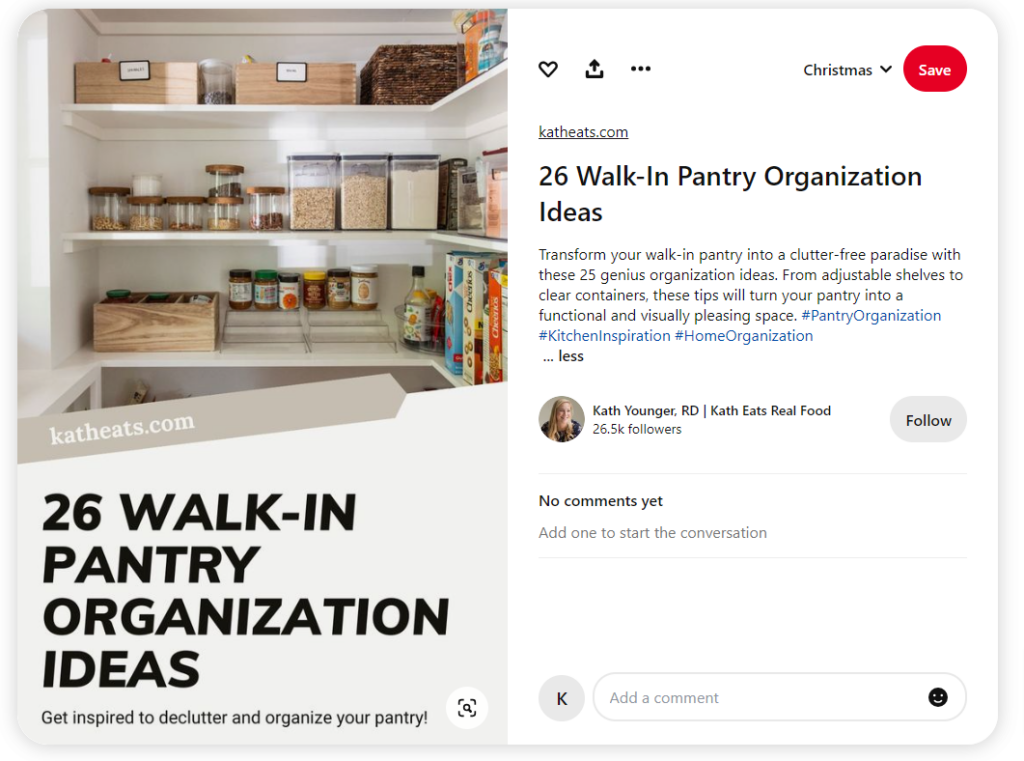
Users come to Pinterest ready to explore and often with a buying mindset. When users pin your posts to their boards, it not only boosts the visibility of your content but also extends its reach over time. Unlike other platforms where visibility can quickly decline, pins on Pinterest can continue to be seen and shared for months, even years.
Pinterest also supports rich pins, which allow you to add extra information directly to the pin itself. This can include details like pricing and product descriptions, making the pins more actionable and directly linking them to affiliate sales.
Additionally, Pinterest is known for driving more referral traffic than many other social platforms. This is particularly valuable for long-term traffic, as your pins can keep generating clicks well after they are initially posted.
TikTok
TikTok is making waves in the affiliate marketing world, drawing in a global audience with its punchy, engaging video content. It’s especially great for those new to affiliate marketing, offering a level playing field where even smaller influencers are achieving higher engagement rates.
The magic of TikTok lies in how its videos are designed to catch on fast – they’re catchy, shareable, and perfect for getting your affiliate content noticed quickly. This platform makes it easy to get your content out there and see your affiliate product recommendations spread like wildfire.
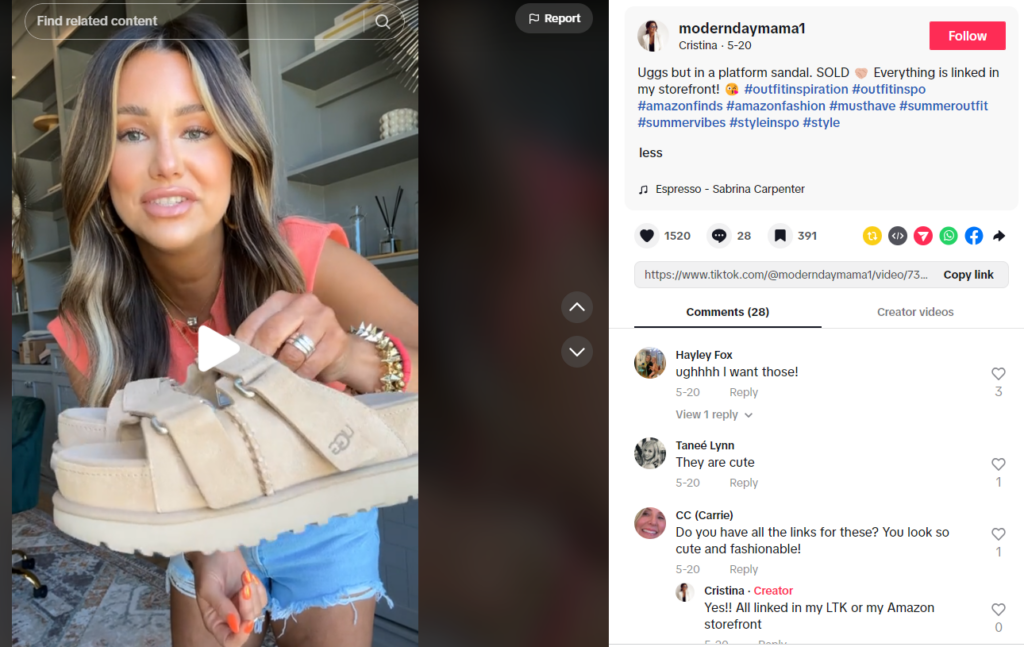
TikTok’s algorithm is another major advantage. Unlike other platforms that might only show content from big-name creators with huge followings, TikTok focuses on how people react to videos.
This means that even if you’re just starting out, you can reach a vast audience if your content clicks with viewers.
Plus, TikTok is stepping up the game with its ecommerce integrations. Features like in-app purchases and direct links to products mean you can not only entertain but also sell right through your videos.
This makes it super easy for followers to buy what they see without ever leaving the app, seamlessly blending entertainment with effective marketing strategies.
How to Use ThirstyAffiliates to Effectively Promote Affiliate Links on Social Media
Have you decided which social media platform to use for promoting your affiliate links? Awesome! Now, you need a tool to make your links perform at their best. That’s where ThirstyAffiliates comes in.
ThirstyAffiliates makes managing your affiliate links super easy, no matter which social media platform you choose. Here’s how it can help you get the best results in your social media campaigns:
- Shorten and Brand Affiliate Links: ThirstyAffiliates lets you shorten and customize your affiliate links, turning long, messy URLs into neat, branded ones. This not only makes your links look professional but also makes them more attractive and trustworthy, boosting your click-through rates.
- Organize Links into Social Media Campaign Categories: You can organize your affiliate links by social platform or product type with ThirstyAffiliates. This makes it easy to keep track of your campaigns and optimize your marketing efforts across different social media channels.
- Track and Analyze Affiliate Link Performance: ThirstyAffiliates doesn’t just help you manage your links – it also provides detailed analytics to track how your links are performing. This helps you understand what your audience likes, tweak your strategies, and focus on the links that drive the most traffic and conversions.
With ThirstyAffiliates, you’ll have everything you need to make your social media affiliate marketing efforts as effective as possible.
Conclusion
Promoting affiliate links on social media can be incredibly rewarding for both new and seasoned marketers if you use the right platforms and tools. By understanding your audience and choosing the best platforms for your content, you can maximize your reach and impact.
ThirstyAffiliates takes the hassle out of managing your affiliate links. It allows you to create neat, branded URLs, organize your links by campaign, and monitor their performance with ease.
This means you can focus on creating engaging content that resonates with your audience and boosts your earnings.
What tip would you give to someone just starting out in affiliate marketing on social media? Share your insights in the comments section below!
If you liked this post, be sure to follow us on Twitter, Instagram, Facebook, Pinterest, and LinkedIn! And don’t forget to subscribe to our newsletter!

your blog give me more knowledges about affiliate marketing strategy
Great post. Instagram is a puzzle to me but Facebook and Youtube are relatively easy to understand. I like to participate in Facebook groups and lead them back to my Fan Page, then start my pre-selling from there. On Youtube it’s obvious to post a good video, and include your affiliate links in the description of the video.
Thank you so much. Facebook groups are great if I provide value. What you think about interest?
I love the idea of using a service like linktree to provide links to your website or affiliate links – this tip is well underrated. The Facebook groups is also a great idea to develop a long term audience for affiliate marketing.
Great tips, Will.
I like the idea of using social media to boost the traffic. Also, the information is very useful.
Big thanks for shariing this great post that will help all bloggers.
Great blog. Keep up the good work!
That is really fascinating, You are an overly professional blogger.
Yes good one really impressive thanks for sharing this
Yes good one really impressive thanks for sharing this
Great Article and very useful thanks and do more article like this.
It was great, I have read your article and its so useful, this is my first time to visit this website am sure i will find more useful content to read like this.
Thank you for sharing a great blog. Social Media Platforms can be very important for businesses because it allows them to reach a wider audience without having to invest in traditional forms of advertising, such as print or television ads.